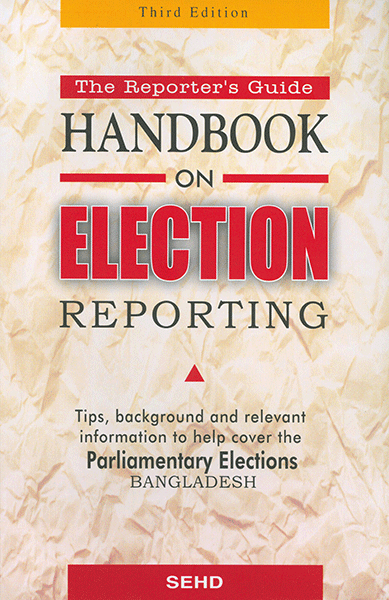Edited by Philip Gain
Published by Society for Environment and Human Development (SEHD
English 3rd Edition PBK 388, 2006 with 90 pages, update in 2008
Tk. 300/US$10
 ‘At the national level Bangladesh has had eight parliamentary elections, three presidential elections and three referendums since its independence. Many of these elections were shams, heavily rigged and invalid. Of course, the fifth, seventh and eighth parliamentary elections enhanced democratic credibility and generated hope among the voters about establishing democracy in Bangladesh. However, the lingering political unrest, mistrust and uncertainties stand out to be serious limiting factors for establishing democracy in Bangladesh. It is in this context that Bangladesh now awaits the ninth parliamentary elections scheduled for January 2007.
‘At the national level Bangladesh has had eight parliamentary elections, three presidential elections and three referendums since its independence. Many of these elections were shams, heavily rigged and invalid. Of course, the fifth, seventh and eighth parliamentary elections enhanced democratic credibility and generated hope among the voters about establishing democracy in Bangladesh. However, the lingering political unrest, mistrust and uncertainties stand out to be serious limiting factors for establishing democracy in Bangladesh. It is in this context that Bangladesh now awaits the ninth parliamentary elections scheduled for January 2007.
There are many conditions that shape the aspired politics and democratic institutions of a country like Bangladesh. The free flow of information is one such condition that can be strengthened by research, documentation and investigative reporting on politics, candidates who contest in the elections, irregularities that take place during election times in violation of electoral laws, code of conduct, and so on. With this in mind the Society for Environment and Human Development (SEHD), a non-profit Bangladeshi organization engaged in research and writing on parliamentary elections among other issues, has produced this book, “Handbook on Election Reporting”.
The handbook [first published in 1995 and then in 2001] has turned out to be a useful guide for reporters, election monitors and researchers. SEHD committed to publish the third edition of the handbook before the ninth parliamentary elections. SEHD now fulfills its commitment by publishing the third edition of the handbook.
The handbook [with 19 chapters] compiles practical guidelines for election reporting at different stages; essential background information on elections in this country, which can be helpful in writing analytical reports; thumbnail sketches of the laws and opinion polls concerning elections; coverage of elections in the electronic media; annexes on the containment in the constitution about the non-party caretaker government, code of conduct for the political parties and candidates; list of the constituencies with the winners and runners-up in the 2001 elections; names and contacts of the major political parties, and a list of election maladies that generally occur in the Indian elections that may be comparable to our situation.
The handbook also puts together relevant contacts and their telephone numbers that may be helpful for reporters and election observers to quickly locate different sources of information.
Contributing writers: Mr. Ataus Samad, Prof. M. M. Akash, Prof. Sakhawat Ali Khan, Dr. Hossain Zillur Rahman, Mr. Obaidul Huq, Mr. Richard Galpin, Mr. Farid Hossain, Dr. Subrata Shankar Dhar, Mr. Philip Gain, Ms. Q. A. Tahmina, Mr. Shishir Moral, Mr. Muniru-zzaman, Mr. Manik Saha, Dr. Mohiuddin Farooque, Ms. Rizwana Hasan, Ms. Khadiza Khanam, Ms. Shanjida Khan Ripa, Mr. Alimul Hoque and Mr. Abdur Razzak Khan.
